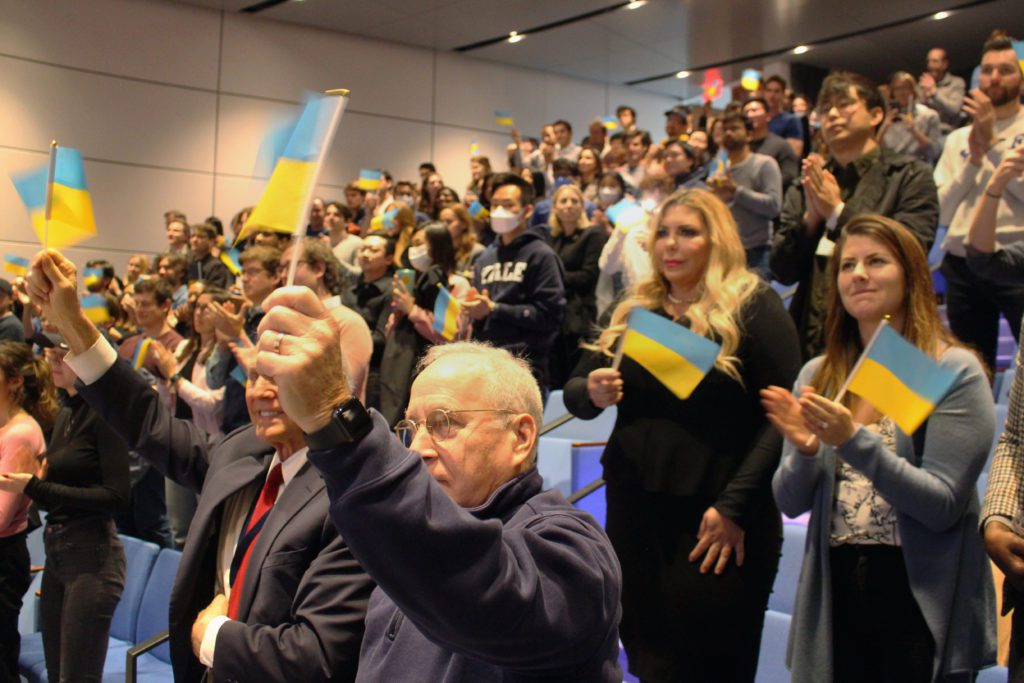“Global fate of democracy” at stake: Zelenskyy addresses war in Ukraine at SOM talk
Senators Richard Blumenthal and Lindsey Graham joined Ukrainian President Volodymyr Zelenskyy in calling for bipartisan and multinational efforts to end the war in Ukraine.

Yash Roy, Contributing Photographer
Over eight months after Russia’s invasion of Ukraine, Ukrainian President Volodymyr Zelenskyy emphasized the need for continued support at a question and answer session hosted by the Yale School of Management.
Last Friday, students and faculty gathered in a packed auditorium in Evans Hall to hear Zelenskyy’s address. SOM professor Jeffrey Sonnenfeld moderated the live Q&A with Zelenskyy, who joined virtually and spoke through a translator. Sen. Richard Blumenthal LAW ’73 (D-CT) and Sen. Lindsey Graham (R-SC), who have previously advocated for increasing US support for Ukraine, joined the talk. Senior White House Correspondent Kayla Tausche also attended the event, which was broadcasted by CNBC.
Throughout the session, Zelenskyy thanked Ukraine’s allies for their continued support and expressed hope that the war would end soon, but emphasized that negotiations remain unlikely until Russia leaves Ukrainian territories.
“We are not ready to talk to [Russian President Vladimir] Putin,” Zelenskyy said. “With this disrespect to sovereignty, to the freedom of our citizens, our choice and our territorial integrity … they have their hands in blood, and it will really be a challenge to clean those hands.”
In June, Zelenskyy called on G7 leaders to “do everything possible” to end the war by the end of the year and urged fellow nations to maintain pressure on Russia. When asked at the event if the end is in sight, Zelenskyy asserted that “[the war] will end soon,” but also emphasized that the situation is “complex” and dependent on both the participation of Ukraine’s partners and the actions of Russia.
The statements come just a day after the Pentagon announced a new $275 million package of weapons and other aid to Ukraine in an attempt to drive Russian forces out before winter.
During the session, both Blumenthal and Graham reaffirmed their support for sending more aid to Ukraine. The two senators visited Zelenskyy in Ukraine over the summer and recently proposed a resolution that would designate Putin’s Russia as a state sponsor of terrorism.
“There should be no negotiations without [Zelenskyy] and the people of Ukraine,” Blumenthal said. “We should not pull back at this point. We should not be talking about diminishing our support, we should be redoubling our support, particularly when it comes to air defenses.”
Blumenthal suggested that the United States should halt its arms sales to Saudi Arabia and redirect them to Ukraine, a situation that he called “a fight that involves our national security.” Between 2017 and 2021, Saudi Arabia bought 23 percent of all US weapons sold, according to Stockholm International Peace Research Institute.
Graham echoed Blumenthal’s statements and added that the Ukrainian war is similar to a “proxy fight” with many global implications at play. Previously, both Blumenthal and Graham had warned that China is watching the US’s response to Russia’s attack, which could affect Chinese aggression in Taiwan.
“If we don’t get Ukraine right, there goes Taiwan,” Graham said. “And if we don’t get Ukraine right, this war continues in Europe. So when it comes to Putin’s invasion of Ukraine, you either pay now or you pay later.”
Graham added that he believes that there will be a new package of military and economic assistance ready before the new Congress is sworn in. He continued by noting that by the end of the year, Russia is likely to be designated as a state sponsor of terrorism.
Like Graham, Zelenskyy explained that Russia’s invasion is not only an unmediated attack on Ukraine, but also an attack on democratic principles for the entire free world.
“We should not give Russia even the smallest hope that its terror can work,” Zelenskyy said. “It is exactly right now in Ukraine, where it is decided whether our parts of the world will remain free and democratic. And this will ultimately identify the global fate of democracy.”

The event was moderated by Sonnenfeld, whose research on companies leaving Russia went viral earlier this year. Along with a team of student researchers, Sonnenfeld developed a rubric that grades companies on their ties to Russia. During the event, Sonnenfeld described the current exodus of multinational corporations as an “economic boycott” that stands unequaled in history.
Following Sonnenfeld’s opening statement, University President Peter Salovey introduced Zelenskyy. In an email to the News, Salovey highlighted the role of academics in the path towards creating policy to support Ukraine.
“Yale remains committed to supporting members of our Ukrainian community and students and scholars from elsewhere in the region,” Salovey wrote. “We also continue to contribute scholarship and research to help policymakers chart a path toward peace.”
Tania Tsunik ’24, a Ukrainian student from the same town as Zelenskyy, concluded the session by asking about Ukraine’s plans for post-war reconstruction. In response, Zelenskyy stressed that “we cannot go back to [the] country before the war” and described a need for upgraded security, education and investments in Ukrainian businesses.
History professor Timothy Snyder described the war in Ukraine as a fight for freedom and for the future.
“Freedom is about the future,” Snyder said. “Freedom also involves freedom from fear. Fear is what the Russian side has left … what we have now is a chance with the Ukrainians with their victory to open up much better futures for all of us.”
Russia invaded Ukraine on Feb. 24.







